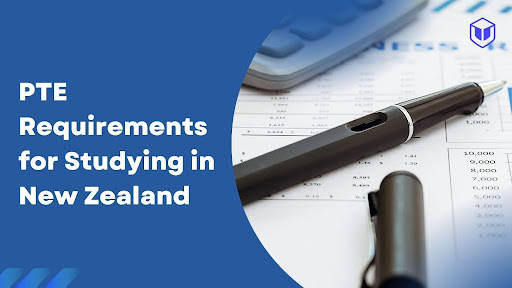Your New Zealand career depends on three non-negotiable PTE scores. Do you know the difference between them?
If you are an Indian student or skilled professional planning your future in New Zealand, the Pearson Test of English (PTE) Academic is the critical initial hurdle. The problem is not choosing the test, but mastering the three distinct score thresholds mandated by Immigration New Zealand (INZ) for study, work, and long-term residency.
Misunderstanding these thresholds is the single biggest risk, as a low score can invalidate your job visa or permanently block your path to Permanent Residency (PR).
This guide cuts through the confusion immediately. We break down all the official New Zealand PTE Requirements 2026, clarifying the exact score you need for your Student Visa, Work Visa, and Skilled Migrant PR points, enabling you to prepare strategically and secure your future.
What is the Minimum PTE Score for New Zealand Visas?
The strategic minimum score you should target is PTE 58 to study in New Zealand.
While Immigration New Zealand (INZ) accepts three different score thresholds, aiming only for the minimum for the Student Visa (PTE 47) is a common mistake that creates major future problems. The Graduate Visa (the work permit) requires PTE 55, and claiming maximum points for Permanent Residency (PR) requires PTE 58.
To ensure your investment leads to long-term settlement, your preparation strategy must focus on securing the PTE 58 benchmark. This single score immediately satisfies the requirements for Study, Work, and Permanent Residency simultaneously, allowing you to bypass future re-testing, save time, and maximize your immigration points immediately.
PTE Academic Score Requirements by Visa Category
These are the official numbers set by Immigration New Zealand (INZ). Use this to see exactly where you stand:
| Visa Category | Applicant Role | Minimum Overall PTE Score | Sectional Caveats (If Applicable) |
| Skilled Migrant Category (PR) | Principal Applicant | 58 or more | None specified for overall acceptance |
| Parent Resident Visa | Principal Applicant | 36 or more (Overall) | OR 29 or more in at least two skills |
| Global Impact Work Visa | Principal Applicant | 58 or more | None specified for overall acceptance |
| Accredited Employer Work Visa (ANZSCO 4-5) | Principal Applicant | 29 or more | None specified for overall acceptance |
| Skilled Residence Visas | Partner or Dependent Child (16+) | 36 or more | None specified for overall acceptance |
Strategic Tip: If you are a student aiming to transition to PR after your studies, target a PTE score of 58 or higher on your very first attempt. This aligns you with the “Competent English” standard required for skilled migration, maximising your future career and residency options immediately.
University PTE Score Requirements for Indian Students
Getting the visa is one thing; getting into your dream university is another.
While your student visa might only require a basic score, universities often set the bar higher. Why? Because they need to ensure you can handle complex lectures and assignments. They also look at “sectional scores” to make sure you are proficient across all four skills: Reading, Writing, Listening, and Speaking.
1. PTE Score for New Zealand After 12th (Undergraduate)
For most standard Undergraduate Programs, the requirements are moderate.
- Target Score: Typically in the 50–57 range.
- Top Universities: The minimum is often an overall 50, but here is the catch: you usually need a score of at least 42 in every single section.
2. PTE Score for New Zealand Masters Programs (Postgraduate)
For Master’s degrees, the academic rigour increases, and so do the requirements.
- Target Score: usually ranges from 58 to 65.
- PhD in New Zealand/ Other High-Level Programs: For research-intensive degrees, the score can rise to an overall 65, with no individual band score less than 58.
University-Specific PTE Requirements (Academic Entry)
To give you a clearer picture, here are the specific requirements for some of New Zealand’s top institutions:
| Institution | Study Level | Minimum Overall PTE Score | Minimum Communicative/Band Score |
| University of Auckland | Postgraduate (Standard) | 58 | No communicative score below 50 |
| University of Canterbury | Postgraduate (Standard) | 58 | No band less than 50 |
| University of Waikato | High-Level – (PG & PhD in NZ) | 65 | No band less than 58 |
| Auckland University of Technology (AUT) | Standard Postgraduate | 58 | No communicative score below 50 |
| Victoria University of Wellington | Standard Undergraduate/PG | 50 | No communication score lower than 42 |
| University of Otago | Standard Undergraduate | 50 | No communicative skills score below 42 |
| Massey University | Standard Undergraduate/PG | 58 | No communicative score below 50 |
| Lincoln University | Standard Undergraduate/PG | 58 | No score less than 50 |
| University of Canterbury | Standard Undergraduate | 50 | No communicative score below 42 |
| University of Waikato | Standard Undergraduate | 50 | No communicative score below 42 |
Student-Centric Insight: Aiming for a high PTE score (58-65) does more than just get you into a course. It also increases your likelihood of securing the maximum Post-Study Work Visa (PSWV) term (up to three years for Level 7+ qualifications).
PTE vs. IELTS: Which is Better for New Zealand?
Stuck deciding between the two tests? Both PTE and IELTS are widely accepted for all visa and academic applications in New Zealand. The choice is personal, but here is a comparison to help you solve the dilemma:
| Feature | PTE (Pearson Test of English) | IELTS (International English Language Testing System) |
| Test Format | Fully Computer-based | Paper-based & Computer-based options |
| Speaking Test | Recorded answers assessed by AI | Face-to-face with a human examiner |
| Results Time | Typically 24–48 hours | 3–13 days (depending on format) |
| Scoring | Automated AI-based scoring (10–90) | Human-evaluated (0–9 Band Score) |
| Difficulty Note | Easier for tech-savvy users; AI grading can be strict | More subjective; speaking test depends on human interaction |
How to Prepare and Achieve Your Target PTE Score
Achieving the required PTE score isn’t just about knowing English; it’s about a preparation strategy. Here is how to solve the preparation puzzle:
- Know Your Score Target: Don’t study blindly. Check your specific university requirement, and keep that 58+ PR target in mind.
- Assess and Plan: Take a mock test first. Identify your weakest sections (is it Speaking? Writing?) and dedicate more time to fixing those specific problems.
- Practice Time Management: The PTE is strictly timed. You need to practice managing the clock during mock tests so you don’t run out of time on the real day.
- Maximise E-E-A-T and Credibility:
- Fact-Checking: Stick to official sources (Pearson’s website, official PTE practice tests) to avoid misinformation.
- Focus on Skills: Use AI tools to fix your pronunciation (for Speaking) and focus on clear structure for your essays (for Writing).
Important Details to Remember:
- Validity: Your PTE score is generally valid for two years from the exam date for most New Zealand applications.
- Attempts: There is no limit to how many times you can take the test, provided you wait five days between tests.
Conclusion: Strategic Preparation for Your New Zealand Future
The core lesson regarding the PTE in New Zealand is simple: do not aim for the minimum to get into the country; aim for the threshold that allows you to stay long-term.
The PTE 58 benchmark is your single most valuable asset, satisfying the requirements for Study, Work, and Permanent Residency simultaneously. Missing this score by just a few points will necessitate costly re-testing and can delay your PR application by months, jeopardizing your overall timeline.
Don’t risk your future on outdated study methods. To master the specific skills needed for the PTE 58 sectional requirements (especially the communicative skills), specialized training is essential.
Ready to secure your New Zealand career pathway with the right score? Prepare for your PTE in New Zealand with Leap Scholar. Our expert trainers provide highly targeted strategies, personalized modules, and focused feedback to ensure you achieve the required score and secure your long-term success.
Frequently Asked Questions
-
Q. Is PTE accepted in New Zealand for PR?
A: Yes, absolutely. PTE Academic is formally accepted by Immigration New Zealand (INZ) for all visa categories, including the Permanent Residency (PR) Skilled Migrant Category. You just need to ensure the principal applicant scores an overall 58 or more.
-
Q. What is the minimum PTE score for a New Zealand student visa?
A: For a student visa, the minimum is usually an overall 50 for most undergraduate courses. However, keep in mind that top universities or master’s programs may ask for 58 to 65.
-
Q. How much PTE score is required for a New Zealand work visa?
A: It depends on the job. For lower-skilled roles (ANZSCO 4-5), a score of 29 is fine. But for professional and skilled work visas, you will need 58 or more.
-
Q. Can I use my PTE scores for university admission and PR application?
A: Yes, you can! You can use the same score for both, provided it meets the minimums for both. If you score a 58+, you are generally covered for both university entry and the Skilled Migrant PR category.
-
Q. How long is the PTE score valid for New Zealand university entry?
A: Generally, scores are valid for two years. Just double-check that your score is still within that valid period when you hit “submit” on your application.























Have Questions? Get Guidance to reach your Dream University
Connect with India's finest counsellors and biggest study abroad community.
Get Guidance